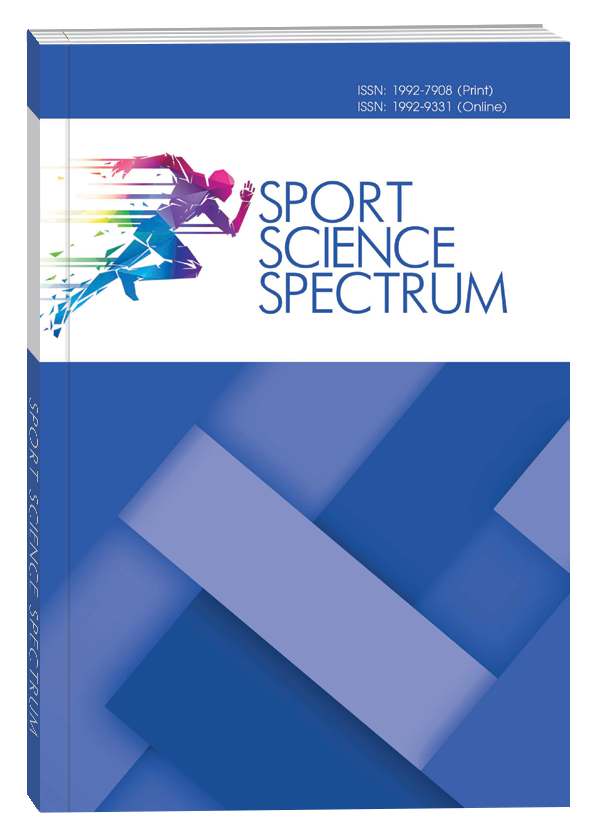DIFFERENTIATION OF THE TRAINING PROCESS OF ACROBATS TAKING INTO ACCOUNT THEIR PERSONAL CHARACTERISTICS (ON THE EXAMPLE OF WOMEN’S GROUPS)
DOI:
https://doi.org/10.32782/spectrum/2024-2-13Keywords:
acrobatic formations, personal characteristics, temperament, motivation, anxietyAbstract
The problem of differentiating the training process is relevant in sports acrobatics, where exercises are performed by partners, with their close interaction, and they may differ in age, character, temperament and gender. Motor and psychological interaction of people in joint activities in various sports is crucial in achieving high results in competitions. Therefore, competitive success is determined by the combined effect of many factors, qualities and abilities, all of which are important and closely interrelated. One of the important tasks of psychological support of the training process in sports acrobatics during training and competitive activity is to take into account the personal characteristics of partners. The objective of this research is to develop and scientifically validate a methodology for fostering a positive psychological climate within an acrobatic composition, with due consideration for the individual personality traits of the participating partners. The research methods employed included a theoretical analysis and generalization of data drawn from scientific and methodological literature, as well as the application of psychodiagnostic techniques, the implementation of pedagogical experiments, and the utilization of mathematical statistical methods. Results. It can be observed that all women’s groups comprise a variety of sociotypes, exhibiting differing degrees of emotional stability and diverse temperamental characteristics. With regard to the five acrobatic formations, it is evident that there is no homogeneity with respect to the dimensions of «introversion–extraversion» and «temperament.» It can be observed that within the female cohort at number 5, all acrobats display a high degree of emotional stability. The implementation of the differentiation method in the educational process, with the objective of improving the psychological climate in the acrobatic composition and developing a motivational climate that takes into account the personal characteristics of the acrobat’s partners, has yielded significantly higher compatibility and effectiveness indicators than those observed prior to the experiment’s commencement (p < 0.05). Additionally, situational anxiety among acrobats has decreased significantly (p < 0.05), as has the reaction to partners and to the trainer’s remarks. The psychological climate in acrobatic teams has also improved significantly (p < 0.05).
References
Боднар ІР. Диференційоване фізичне виховання : навчальний посібник. Львів : ЛДУФК, 2017. 200 с.
Гуцало ЕУ. Від теорії до практики: дослідження малої навчальної групи : навчально-методичний посібник. Кіровоград : РВВ КДПУ імені Володи-
мира Винниченка, 2012. С. 43–44.
Гринь АР, Тихоплав МЮ, Запольский ДП. Комплектования составов на основе психологической совместимости в парно-групповой акробатике
(женские тройки). Матер. ХХVІI Всеукраїнської науково-практичної інтернет-конференції «Вітчизняна наука на зламі епох: проблеми та перспективи
розвитку», 17 лиcтопада 2017 р. Переяслав-Хмельницький, 2017. C. 346–350.
Іваненко В. Особливості розуміння психологічної сутності мотивації досягнення в спортивній діяльності. Науковий вісник Мелітопольського
державного педагогічного університету. Серія «Педагогіка». 2017;1:86–90.
Колеснік ІВ. Диференціація навчально-тренувального процесу юних гімнастів з урахуванням особливостей розвитку нервової системи : дис.
Київ, 2023. 247 с.
Круцевич ТЮ. Влияние свойств высшей нервной деятельности на двигательные способности человека. Физическое воспитание студентов твор-
ческих специальностей. 2001;5:33–39.
Максимов СД. Формування акробатичних складів з урахуванням сумісності індивідуально-психологічних особливостей спортсменів : магістер-
ська робота. https://reposit.uni-sport.edu.ua/
Максимов СД, Воронова ВІ, Максимова ЮА. Індивідуально-психологічні особливості сумісності спортсменів в акробатиці. Теорія і методика
фізичного виховання і спорту. 2023;1:48–54.
Максимов СД, Воронова ВІ, Максимова ЮА. Проблема психологічної сумісності та спрацьованості у спортивній акробатиці / ред. ТМ Булгакова.
Матеріали VI Всеукраїнської наукової електронної конференції «Актуальні проблеми психолого-педагогічного супроводу та розвитку суб’єктів спор-
тивної діяльності», м. Київ, 26 жовтня 2023 р. Київ, 2023, с. 34–35.
Максимов СД, Воронова ВІ, Максимова ЮА. Психологічний клімат в акробатичному складі як фактор спрацьованості акробатів-партнерів/ ред.
ТМ Булгакова. Матеріали VI Всеукраїнської наукової електронної конференції «Актуальні проблеми психолого-педагогічного супроводу та розвитку
суб’єктів спортивної діяльності», м. Київ, 26 жовтня 2023 р. Київ, 2023, с. 32–33.
Філь В. Вплив типологічних властивостей особистості на спортивні досягнення: теоретичний аспект. Магістерський науковий вісник Терно-
пільського національного педагогічного університету імені Володимира Гнатюка. 2018;29:73–75.
Babushkin GD. Psihologicheskaya sovmestimost i srabatyvaemost v razlichnyh vidah sportivnoj deyatelnosti. Teoriya i praktika fizicheskoj kultury.
;(10):28–30.





